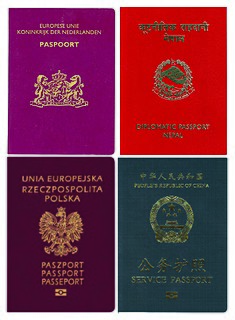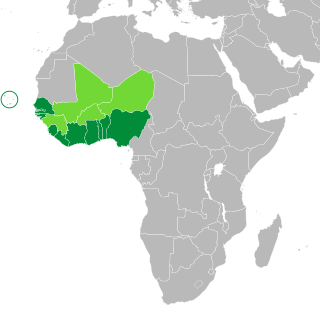 W
WA passport is an official governmental document that contains a given person's identity. It helps its holder travel under its protection to and from foreign countries. The document certifies the personal identity and nationality of its holder. Standard passports contain the full name, photograph, place and date of birth, signature, and the expiration date of the passport.
 W
WThe African Union Passport is a common passport document that is set to replace existing nationally issued African Union member state passports and exempt bearers from having to obtain any visas for all 55 states in Africa. It was launched on July 17, 2016, at the 27th Ordinary Session of the African Union that was held in Kigali in Rwanda by Rwandan President Paul Kagame and the late Chadian President Idriss Déby. As of June 2018, the passport was planned to be rolled out and ready for use at borders worldwide by 2020, however the rollout has since been delayed into 2021.
 W
WA biometric passport is a traditional passport that has an embedded electronic microprocessor chip which contains biometric information that can be used to authenticate the identity of the passport holder. It uses contactless smart card technology, including a microprocessor chip and antenna embedded in the front or back cover, or centre page, of the passport. The passport's critical information is printed on the data page of the passport, repeated on the machine readable lines and stored in the chip. Public key infrastructure (PKI) is used to authenticate the data stored electronically in the passport chip, making it expensive and difficult to forge when all security mechanisms are fully and correctly implemented.
 W
WA camouflage passport is a document, designed to look like a real passport, issued in the name of a non-existent country or entity. It may be sold with matching documents, such as an international driver's license, club membership card, insurance documents or similar supporting identity papers. A camouflage passport is not a real, valid passport and is to be distinguished from a valid second passport, which an individual with dual citizenship may be eligible to hold, a novelty fantasy passport, or a fake of a real passport.
 W
WThe CARICOM passport is a passport document issued by the 15 member states of the Caribbean Community (CARICOM) for their citizens. It can be used both for intra-regional and international travel. The passport was created to facilitate intra-region travel; however, citizens of the OECS that are citizens from Antigua and Barbuda, Dominica, Grenada, St. Kitts and Nevis, Saint Lucia and St. Vincent and the Grenadines may use a member-state issued drivers licence, national identification card, voters registration card or social security card for travel within the OECS area.
 W
WThe ECOWAS passport is a common passport document for several countries in West Africa.
 W
WA fake passport is a counterfeit of a passport issued by a nation or authorised agency. Such counterfeits are copies of genuine passports, or illicitly modified genuine passports made by unauthorized persons, sometimes called cobblers. Its purpose is to be used deceptively as if it were a legitimate travel or identity document. A passport obtained from an authorized issuer by providing false information may also be considered fake.
 W
WThe Five Nations Passport Group is an international forum between the passport issuing authorities of Australia, Canada, New Zealand, the United Kingdom and the United States to share best practices in the issuance, development, and management of passports. The annual Five Nations Passport Conference is a largely informal in-person meeting between officials of the participating agencies, with some additional invited guests such as the Irish Department of Foreign Affairs and Trade in 2011. It has taken place since at least as far back as 2004.
 W
WDanish passports are issued to citizens of the Kingdom of Denmark to facilitate international travel. Besides serving as proof of Danish citizenship, they facilitate the process of securing assistance from Danish consular officials abroad.
 W
WA Hajj passport is a special passport used only for entry into Saudi Arabia for the purpose of performing hajj.
The Hong Kong Special Administrative Region Document of Identity for Visa Purposes is a biometric travel document issued by the Hong Kong Immigration Department to residents of Hong Kong who are unable to obtain a national passport. It is usually valid for seven years.
 W
WThe International Certificate of Vaccination or Prophylaxis (ICVP), also known as the Carte Jaune or Yellow Card, is an official vaccination report created by the World Health Organization (WHO). As a travel document, it is a kind of medical passport that is recognised internationally and may be required for entry to certain countries where there are increased health risks for travellers.
 W
WA passport stamp is an inked impression in a passport typically made by rubber stamp upon entering or exiting a territory.
 W
WPassports in Europe are issued by each state individually, e.g. the Netherlands or UK. In general, passports issued in Europe either grant the holder the right of freedom of movement within the European Economic Area, to those that don't. The majority of European states are members of the European Union, and therefore issue EU passports.
 W
WThe Quality of Nationality Index (QNI) ranks the quality of nationalities based on internal and external factors. Each nationality receives an aggregated score based on their economic strength, human development, ease of travel, political stability and overseas employment opportunities for their citizens. The data is collected from various sources with quantifiable data. The QNI was created by Dimitry Kochenov, an expert in citizenship, nationality and immigration law and constitutional law of the European Union at the University of Groningen and Christian Kälin, chairman of Henley & Partners.
 W
WThe Sovereign Military Order of Malta passport is a travel document issued to officials and diplomats of the Sovereign Military Order of Malta (SMOM). The order issues biometric passports which are fully ICAO9303 compliant.
 W
WWartime Measure Act of 1918 was United States federal legislation deeming wartime travel as an unlawful act when touring without a United States passport.
 W
WThe World Passport is a fantasy travel document sold by the World Service Authority, a non-profit organization founded by Garry Davis in 1954.